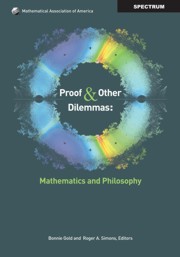Book contents
- Frontmatter
- Contents
- Acknowledgments
- Introduction
- I Proof and How it is Changing
- II Social Constructivist Views of Mathematics
- 4 When Is a Problem Solved?
- 5 Mathematical Practice as a Scientific Problem
- 6 Mathematical Domains: Social Constructs?
- III The Nature of Mathematical Objects and Mathematical Knowledge
- IV The Nature of Mathematics and its Applications
- Glossary of Common Philosophical Terms
- About the Editors
6 - Mathematical Domains: Social Constructs?
from II - Social Constructivist Views of Mathematics
- Frontmatter
- Contents
- Acknowledgments
- Introduction
- I Proof and How it is Changing
- II Social Constructivist Views of Mathematics
- 4 When Is a Problem Solved?
- 5 Mathematical Practice as a Scientific Problem
- 6 Mathematical Domains: Social Constructs?
- III The Nature of Mathematical Objects and Mathematical Knowledge
- IV The Nature of Mathematics and its Applications
- Glossary of Common Philosophical Terms
- About the Editors
Summary
From the Editors
Social constructivism is probably the philosophy of mathematics that has seen the greatest growth in support among mathematicians in the last twenty-five years. However, until now, because of assorted difficulties that this view appears to imply, it has not received serious attention from philosophers of mathematics. For example, see Balaguer's quick dismissal of it in his chapter (section 2.2 and elsewhere). Julian Cole is one of the first philosophers to seriously attempt to deal with these problems. This chapter gives you an introduction to the philosophical issues and how he is attempting to deal with them. His view is still being developed. After reading this chapter, you may want to follow his future work (and that of those who respond to it). In particular, his upcoming article, “Creativity, Freedom, and Authority: A New Perspective on the Metaphysics of Mathematics” seems likely to be of interest.
Julian Cole is an Assistant Professor of Philosophy in the Department of Philosophy and Humanities at Buffalo State College. His interests are in logic and the philosophy of mathematics. He recently finished a doctoral dissertation on social constructivism as a philosophy of mathematics, under the direction of Stewart Shapiro at The Ohio State University. Prior to his work on social constructivism he wrote a doctoral dissertation in multifractal geometry at the University of St. Andrews under the direction of Lars Olsen.
- Type
- Chapter
- Information
- Proof and Other DilemmasMathematics and Philosophy, pp. 109 - 128Publisher: Mathematical Association of AmericaPrint publication year: 2008



